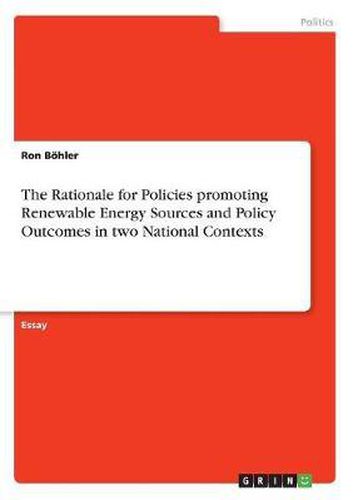Readings Newsletter
Become a Readings Member to make your shopping experience even easier.
Sign in or sign up for free!
You’re not far away from qualifying for FREE standard shipping within Australia
You’ve qualified for FREE standard shipping within Australia
The cart is loading…






Essay from the year 2011 in the subject Politics - International Politics - General and Theories, grade: 1.7, University of Bath, language: English, abstract: The variety of renewable energy sources range from wind, sunlight, biomass and geothermal heat to rain, tides and waves (hydropower). Notwithstanding their massive importance for EU energy consumption, some energy carriers such as biomass and hydro are seen to be ‘deadlocked’ (Del Rio Gonzalez 2008, p.2917), while the promotion of wind power among EU member states is well researched. Hence, the case here shall be made for solar energy, with special reference to the promotion of photovoltaic (PV) power systems due to their suspected potential for further energy transitions in Europe. Being the ‘fastest growing power-generation technology in the world’ (REN21 2010, p.19), corresponding policy outcomes on the Iberian Peninsula will be illustrated and assessed. Rational policy-making aims at effective problem-solving strategies based on cost-benefit-calculations. Decisive is not which particular policy may in total terms maximize the outcome, but which one is optimal in relation to costs that accrue from this policy. The underlying question of rational choice theory thus is, why political decision-makers should prioritise a certain ‘path’ of policy-making over others. A rationale has thus always been assessed with regard to the effectiveness and efficiency towards a desired or intended political outcome. The Spanish and Portuguese National Renewable Energy Action Plans portray an adequate guideline for further analysis.
$9.00 standard shipping within Australia
FREE standard shipping within Australia for orders over $100.00
Express & International shipping calculated at checkout
Essay from the year 2011 in the subject Politics - International Politics - General and Theories, grade: 1.7, University of Bath, language: English, abstract: The variety of renewable energy sources range from wind, sunlight, biomass and geothermal heat to rain, tides and waves (hydropower). Notwithstanding their massive importance for EU energy consumption, some energy carriers such as biomass and hydro are seen to be ‘deadlocked’ (Del Rio Gonzalez 2008, p.2917), while the promotion of wind power among EU member states is well researched. Hence, the case here shall be made for solar energy, with special reference to the promotion of photovoltaic (PV) power systems due to their suspected potential for further energy transitions in Europe. Being the ‘fastest growing power-generation technology in the world’ (REN21 2010, p.19), corresponding policy outcomes on the Iberian Peninsula will be illustrated and assessed. Rational policy-making aims at effective problem-solving strategies based on cost-benefit-calculations. Decisive is not which particular policy may in total terms maximize the outcome, but which one is optimal in relation to costs that accrue from this policy. The underlying question of rational choice theory thus is, why political decision-makers should prioritise a certain ‘path’ of policy-making over others. A rationale has thus always been assessed with regard to the effectiveness and efficiency towards a desired or intended political outcome. The Spanish and Portuguese National Renewable Energy Action Plans portray an adequate guideline for further analysis.